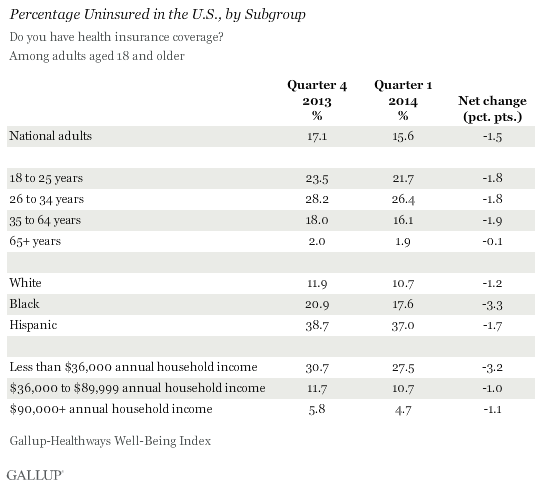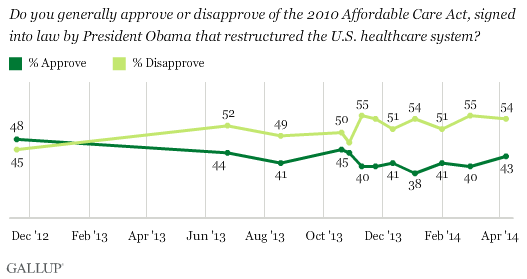 y66, on 2014-April-08, 14:38, said:
y66, on 2014-April-08, 14:38, said:
Krugman posted
this today:
Oops, I got the Krugman link mixed up with the Gallup link. Oh well. Anyway. it's the Gallup link I am getting the numbers from.
http://www.gallup.co...owest-2008.aspx
I have adjusted my comments some to reflect the fact that the figures were not Krugman's.
Let's just see how the percentages and the absolute numbers match. Of course if you get to choose the numbers you want, they will match fine.
The Gallup graph shows a 16.3 uninsured rate at the beginning or 2013 and a 15.6 rate at the end of Q1, 2014. That's a change of 0.8 I am not sure if this rate refers to adults or to all Americans. Their later charts break the data into age groups starting at 18. But perhaps they mean all Americans, all 330 million or so of us. If I multiply 0.008 by 330 I get 2.64. I see the gallup chart does say it is concerned with those over 18. But maybe we should just extrapolate.
Now it is true that I could use, instead of the 15.6 number associated with the beginning of 2013, the number 18.0 associated with mid 2013. The problem with that is that the number seems to be a historical anomaly. At the very least, it is higher than the number at any other point on the graph. What we see is a steady increase from 15.6 to 18.0 during the first half of 2013, and then a steady drop to 15.6 at the end of Q1 this year.
Krugman is a smart guy, he may understand the reasons for both the rise and the fall. I hope he will address such issues seriously, he has the training to do it.
The story beneath the graph says that the rate is continuing to fall. This could be good news, perhaps very good news. We shall see.
Incidentally the graph shows a rate of 15.4 at the beginning of 2009 so it's hard to see this as great progress. But there was this one sharp drop, coming right after a sharp increase.I don't know what to make of it, but it seems as if a place to start looking for an explanation would be that many people dropped insurance that they had, sending the rate of uninsured up, and then got insurance through ACA, sending the numbers back down. Or maybe it is something else entirely
The point is that it is not reasonable to look only at the numbers that are going down, and ignore the fact that they went down mostly by undoing a recent significant increase.
So back to what I was saying: It will be a while before it is really clear what we have and have not accomplished. I have no enthusiasm for bad news, I just wish to see a sober analysis.
Added: Here is a practical issue for Democrats regarding November elections. Can they run on the success of the ACA? They will need to make the case that it has been successful. If they say "Look at how the percentage of unisured has gone down since the middle of 2013" but have no answer to those who note that the comparison with the beginning of 2013 shows a much less significant change, they will change no minds and change no votes. Those who were already planning to vote their way, some of them, will buy this argument, no one else will. So if indeed it has been a success, they need to start now with solid explanations of why this is so.Calling people stupid if they disagree, as Krugman does, isn't the way to change minds.
 Winstonm, on 2014-February-07, 13:56, said:
Winstonm, on 2014-February-07, 13:56, said:
 Help
Help




